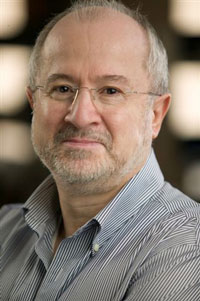 |
A. “Angie” Rizzino, Ph.D. |
NOTE: This profile is part of a series highlighting the 26 researchers who were named UNMC Distinguished Scientists or New Investigators for 2007. Each of these researchers will be profiled in UNMC Today leading up to a March 20 ceremony to recognize their achievements.
- Name: Angie Rizzino, Ph.D.
- Title: Professor
- Joined UNMC: 1983
- Hometown: East Northport, N.Y.
Briefly describe your research in laymen terms.
The research in my laboratory seeks to decipher the molecular machinery that enables stem cells to replicate with little or no limit. Stem cells ultimately give rise to all differentiated cell types of the body. However, aberrant stem cells appear to be primarily responsible for the initiation and growth of malignant tumors.
What led you to pursue this area of research?
I recognized long ago that understanding of the biology of stem cells is essential for making meaningful progress in three exciting areas of science: developmental biology, cancer biology, and what has become regenerative medicine.
How do you see your research contributing to science?
In addition to training future scientists, our research seeks to lay the foundation for determining how to manipulate stem cells in the clinic. Learning how to disrupt the ability of tumor cells to replicate without limit, for example by directing them to differentiate into non-proliferating cells, would vastly improve the treatment of virtually all tumors.
Why did you become a scientist?
A career in science is a lifestyle and not a job. You have the opportunity to work with, and around, people who love to think and enjoy learning. Each day, you have the chance to learn something new. Science is a lot like playing an unending game of chess against the unknown. If you make the right move, you advance our collective knowledge. If not, at least you tried. If you are lucky, you make the world a better place to live.
What is your hope for the next generation of scientists?
I hope they will think critically and use their talents to tackle problems that threaten humanity. They have much work to do. I also hope they recognize that they have the responsibility of properly training the generation of scientists that follows them. Additionally, I hope they think deeply about how to teach effectively. It is better to teach a few important things well, rather than to teach a “bunch of stuff” that their students will soon forget. Teaching the way one was taught is not always the best formula.
Beyond grant funding, how do you measure success?
I judge success primarily by the quality of one’s ideas and how well one trains the next generation of scientists.
What would you tell a student interested in a research career?
Besides telling them what a research career entails, I would tell them, work hard, think critically, work well with others, and follow your dreams. Life is too short. Do something you love.
Do you have a hero/role model? If so, what do you admire most about this person?
There have been many heroes in my life, especially when I was growing up. Two of my high school teachers (Mr. Sonen, biology and Mr. Cass, chemistry) made science exciting. Carl Moos Ph.D., a professor of biochemistry at SUNY Stony Brook, showed me that being a scientist does not mean that you cannot have a commitment to other problems in the world. My parents exhibited the qualities of hard work and unqualified commitment to their children and, by their example, helped me understand what it means to “go to the wall” for someone.
Tell us about your family and hobbies outside of the lab.
I am married with one 18-year-old daughter. I met my wife, who was born and raised in England, nearly 30 years ago in Paris. We enjoy vacationing and hiking in the mountains. Viewing mountain vistas while sitting on the top of a mountain always invigorates me. Each summer, I look forward to playing softball with the graduate students. The season is always too short.
List three things few people know about you.
- In my freshman year of high school, I barely passed general science with a 65. Had it not been for a scheduling conflict, I would have ended up in a biology class with a teacher who would have discouraged any residual interest I had in science. Instead, I was switched to Mr. Sonen’s biology class. The following two years, my grades in biology and chemistry were in the high 90s, while earning a 99 in both New York State Regents Examinations. Good teachers really do make a difference.
- I first met my wife in Paris a few weeks before I was scheduled to return to the United States after a four-month stay at the College de France. Within a couple of days, I asked her if she would like to come to San Diego for a visit. The following Sunday, while hiking around the Château de Fontainebleau outside of Paris, she said yes. The rest is history.
- In my career, I turned down three lucrative offers from industry. I have no regrets.